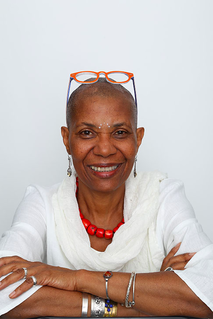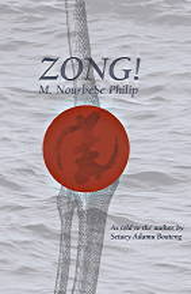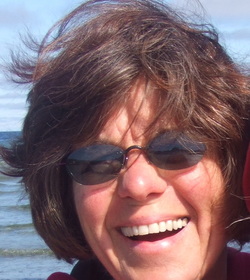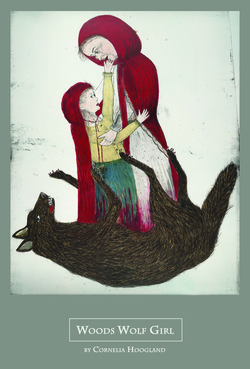 M. NourbeSe Philip M. NourbeSe Philip M. NourbeSe Philip will join us at Western University as the 2013-14 Writer-in-Residence in the Fall term. Guggenheim fellow, winner of a Toronto Arts Award, poet, fiction writer, essayist, dramatist and lawyer, M. NourbeSe Philip was born in Tobago and moved to Canada to attend Western University, where she graduated with a law degree in 1973. After seven years in practice, first at Parkdale Community Services and then in the partnership Jemmott and Philip, Philip left law in 1983 to devote her time to writing. Philip’s most recent book, Zong! (2008) is a book-length poem based on an eighteenth-century court case, Gregson vs. Gilbert, the only public document related to the lives and deaths of 150 Africans murdered for insurance money aboard the slave ship Zong. Fugal, fragmented, and deeply moving, Zong! has been adapted through multimedia performance, including a dramatized reading at Toronto Harbourfront as part of "rock.paper.sistahz" in April 2006. In 2012, Philip held a seven-hour interactive reading of the complete poem at b current studio space in Toronto while simultaneously, in Blomfontaine, South Africa, another audience held a collective reading. Philip’s other major works include the young adult novel Harriet’s Daughter (1988), her second novel Looking for Livingstone: An Odyssey of Silence (1991) and the groundbreaking and award-winning poetry collection She Tries Her Tongue, Her Silence Softly Breaks (1989), winner of the Casa de las Americas Prize in poetry. Author of four collections of essays, three additional collections of poetry, and two plays, Philip’s work spans and interweaves genres, attending to language in particular—her work is often noted for its deconstruction of grammar, while her newest poem engages legal language. Philip takes up themes of colonialism, race, memory, identity, and place, modeling the intersections of politics and poetics with her innovations on form. In her non-fiction work, Philip is a committed social critic, bringing her years of study in economics, political science and law to bear on Canadian social policy. Her poetry is included in the new collection, The Great Black North: Contemporary African-Canadian Poetry (Frontenac House, 2013). Biography by Nina Budabin McQuown RUSTY TALK WITH M. NORBESE PHILIP Scott Beckett: What is your first memory of writing creatively? M. NourbeSe Philip: My first memory of writing creatively was actually writing a piece about my fear of flying which was sparked by being on a plane with my very young son for the first time. I remember taking him to the washroom and him being so fascinated by the loud sucking noise of the toilet while all I could think of was what was on the other side of the toilet—space, nothingness. It was actually published in a traveller’s magazine whose name I now don’t remember. SB: How did you decide to become a writer? NP: The process was very gradual. I come from an island nation that was once a colony of the British Empire and, as a young child, lived through a very exciting time as the island moved towards independence. Part of the change was that for the first time there was universal secondary education and parents wanted what all parents want for their children—the best. This did not include becoming writers. There is an essay I wrote about this process of coming to writing, “The Absence of Writing or How I Almost Became a Spy,” in which I talk about reading a lot as a child, and I write something to this effect: “Books for so.” (The Caribbean vernacular for saying there were lots of books.) Other people were writing them, we were reading them. The mindset was that you wanted your child to be a lawyer or a doctor, failing that then a teacher or, perhaps, nurse, and if all else failed then a civil servant. Writing was not an option. It’s important to understand that for me writing wasn’t on my radar. I began writing poetry while I practised law, and even though I knew I wasn’t going to spend the rest of my life in law (I think I did law because my father wanted to be a lawyer and never did become one), I still didn’t think I would become a writer. But at some point I remember thinking maybe, just maybe, I’ve got something to say that someone might listen to. It was that tentative, for all those historical and cultural reasons. It certainly wasn’t a sort of Saul-on-the-way-to-Damascus type of epiphanic event. SB: What is your writing process like? Do you write in a certain place or time? Is it an everyday activity, or is it when the ideas come to you? NP: I like writing in the mornings and I try to do it—emphasis on the “try”—on a daily basis. I don’t always succeed. Having said that, however, I find myself “scribbling” every day. It might not necessarily be something that I’m thinking will be my next poem or my next novel or next play, but I am always aware that these scribbles could be useful. Periods of time will get more intense, of course, if there’s a project that is formed, or there is a piece of writing I feel I have to do—then it all becomes a lot more conscious and focused. But those “scribbles” are really important because they are scribbles. Often you may think that they’re not important but later on, you realize that they can be very helpful. It is the fact that they are scribbles and “not important” that makes them valuable—the untethered mind in free fall. SB: Has anything important come from these sessions of “scribbling?” NP: Yes, I have a sense that I have one more book of poetry and what I have in mind actually is based on those “scribbles.” SB: So that is what you’re working on right now? NP: Yes, or not working on, or un-working on. SB: Is there a piece that you’ve written that you are particularly fond of that you would consider to be your favourite? NP: It is like asking which of your children you like best. Different pieces for different reasons, but I’ll say Zong! right now, maybe because it is my most recent child, my youngest child. I’m saying that also because it is moving into areas that I have never ever ventured in to. My work has tended to be primarily page bound, as much poetry is, but this work is moving into performance or what I call unperformance or de-performance, and I’m really interested in that. SB: What is your advice to young writers? NP: At any point in time, there are at least two poems, two stories, two novels that are there: the one you think you want to write, the other, the one you have to get out of the way of to let it write itself through you. What I’m talking about is getting your ego out of the way to let what has to be written write itself through you. So writing then becomes an act of surrender and revelation to yourself. And ultimately to the reader.  M. NORBESE PHILIP'S MOST RECENT BOOK Zong!, Weslyan University Press and by The Mercury Press in Canada, 2008 Description from the Publisher: In November, 1781, the captain of the slave ship Zong ordered that some 150 Africans be murdered by drowning so that the ship’s owners could collect insurance monies. Relying entirely on the words of the legal decision Gregson vs Gilbert--the only extant public document related to the massacre of these African slaves--Zong! tells the story that cannot be told yet must be told. Equal parts song, moan, shout, oath, ululation, curse, and chant, Zong! excavates the legal text. Memory, history, and law collide and metamorphose into the poetics of the fragment. Through the innovative use of fugal and counterpointed repetition, Zong! becomes an anti-narrative lament that stretches the boundaries of the poetic form, haunting the spaces of forgetting and mourning the forgotten. Information on how to meet with NourbeSe Philip for London and Western folks: NourbeSe Philip will hold weekly office hours on Tuesdays and Wednesdays from 10:00 am to 5:00 pm, to offer feedback to, and consultation with, both experienced and novice creative writers from the university and the London community. She will accept works of poetry, fiction, creative non-fiction and drama. Scott Beckett is Western University's 2013-14 Student Writer-in Residence.  Cornelia Hoogland Cornelia HooglandPhoto by Hennie Aikman Woods Wolf Girl (Wolsak and Wynn, 2011) is CORNELIA HOOGLAND'S 6th book of poetry, and is based on the fairy tale, Red Riding Hood. Fountainhead Theatre in London Ontario is producing Red’s Canadian premiere in May 2013. Hoogland’s poetry, as well as her nonfiction, fiction and plays have been published and performed internationally. Cornelia has received writing awards from the Canada Council, Ontario Arts Council and selections from her 6 books of poetry, two chapbooks and nonfiction have won numerous literary competitions and have been shortlisted for various CBC literary competitions, the Relit awards, and the National Magazine Awards. Cornelia has taught writing and literature at the University of Western Ontario, UBC Okanagan, Simon Fraser University, and has led seminars, workshops and tutorials at festivals and school districts. She lives on Hornby Island with her visual artist husband Ted Goodden and dog Drummer. Visit Cornelia online at her website, at her Woods Wolf Girl site, and on Facebook. RUSTY TALK WITH CORNELIA HOOGLAND Kathryn Mockler: What is your first memory of writing creatively? Cornelia Hoogland: I remember tracing the colour blue from its starting point above the clouds, to the mountains, the ocean, the Douglas-fir trees, grains of sand, the beach towel and then the colour splintering into my child’s blue eyes. Speaking of one thing in terms of another – what a miracle is metaphor. The blue poem took place at Rathtrevor Beach on Vancouver Island 35 years ago. I lost that poem and yet—have lived it all these years. Following where the line, idea, colour, word takes me. KM: Why did you decide to become a poet/writer? CH: I received my first diary—one inch by two inches—when I was six. I wrote “Dad bought me a comic.” I am a journal keeper still. Every morning I get up and try to scratch out a few fresh lines. At the Banff Centre for the Arts, Adele Wiseman told my group: “You are all professionals; you’ve all sacrificed to be here in this program. You can call yourself a poet.” Okay, I thought. KM: Who are you reading now? CH: Dean Young, Tony Hoagland, Elizabeth Bishop and many other American poets both living and dead. Canadians Nancy Holmes, Julie Berry, Matt Radar. Alice Oswald, Jack Gilbert, David Harsent writers I admire. My daily literary experiences are often online, however. I read Poetry Daily and follow up the poems onto the Amazon or Google sites where I can read (often) more poems. KM: What do you feel influences your writing the most? CH: My antenna for lines, images, verbs, rhythm, dynamics, juxtaposition. Always on the look-out for the next poetic bread crumb. Reading and hearing other poets, and listening to children. Children say the best things, but I have a long ways to go to hear them properly. I also attend to wolves, dogs, crows. Learning how to write nature poetry, or use natural images, is one of our biggest literary challenge today. KM: Can you describe your writing process? How does revision figure into the process? CH: In writing and editing Woods Wolf Girl (Wolsak and Wynn, 2011), I realized more deeply than I did before the complex relationship between experience and form. Although the poems were written as monologues (Red, Mother, and the Woodsman), finding their voices was by way of delving more deeply into my own. KM: What is the best piece of writing advice you’ve been given that you use? CH: Understanding that poetry is a set of strategies (such as pattern, affect, density). Poetry doesn’t exist to teach us how to live (although it might) or even to show us the world we inhabit (though it might). Poetry is the dynamics of released energies, a dramatization of shaped energies. KM: What is your favourite or funniest literary moment, if you have one? CH: As the director of Poetry London in London, Ontario, I experienced many hilarious moments. Despite detailed emails to visiting poets outlining the program, the expectations, the times, directions and so forth, actually getting the writers from their cities to the London podium could involve tens of emails, an intricate cell phone game the days before and of the reading, great poetic anxiety about directions and schedule, food sensitivities revealed once seated at the restaurant, amazing requests to be driven to antique shops or delicatessens, and so forth. What I loved was the moment said famous authors walked on stage, they were immediately professional, engaging, charming, mannered and poised. The audience loved each of them; in fact, the more troublesome ones were the most sensational! Amazingly, hosts across Canada do similar work on any given night of the week and all for free. KM:Tell us about your play, Red. CH: Red is having its Canadian premiere on May 10–18, 2013, in London Ontario. Fountainhead Theatre is producing the play (John Gerry, director). Tickets available at onstagedirect.com I started writing the play using scenes from Woods Wolf Girl, but the play quickly took on a life of its own and bears little resemblance to the book. Red Riding Hood’s multiple identities throughout the ages, and the plethora of attitudes toward her inform this play. Innocent, sexual, chaste, (chased), unchaste, the girl to blame, fearless, the girl who ‘asked-for-it’, Red (the girl) is also the wolf, the wilderness is inside her. The character Red is not limited in costume, posture, attitude, or age. Arguably the world’s most popular, and most retold, fairy tale, interpreted into countless versions in over 40 different countries over the past nearly 400 years, it transcends cultural barriers. Red takes up complex human concerns, such as how good girls grow up, relationships between mothers and daughters, and the ongoing tensions between agent/victim, eating and/or being eaten. Who is caged, who is protected? (This play is suitable for high school audiences and adults.) For more information please see http://www.facebook.com/cornelia.hoogland. KM: What are you working on now? CH: Once again I am turning to the fairy tale for my inspiration. My multimedia project titled Woods Wolf You: A SoundWalk, is an audiowalk through the woods. Aimed to help create ecological awareness in young people as well as feelings of connectedness—ironically using the very technology (personal stereos) often blamed in alienating people from the physical world—the audio walk conjoins the technologies of sound, the power of the fairy tale Red Riding Hood, and site-specific performance. I’m delighted that London’s own Baseline Press will be publishing my chapbook, Sea Level, in 2013. Sea Level was shortlisted for the CBC literary nonfiction awards in 2012. Karen Schindler is creating one of the most exciting chapbook presses in Canada, and I’m delighted.  CORNELIA HOOGLAND'S RECENT POERTY BOOK Woods Wolf Girl, Wolsak and Wynn, 2011 From the Publisher: Cornelia Hoogland takes the story of Little Red Riding Hood and turns it inside out in this sensuous Canadian retelling. The woods and wolves are vivid and real, while Red herself is anything but a one dimensional girl-child. A meditation on innocence and its loss, and on the power of the green wilderness, Woods Wolf Girl uses striking lyric poetry to expose the heart of the original fairy tale. About Woods Wolf Girl: “Red Riding Hood like you’ve never encountered her before. Hoogland has nailed it in this chilling contemporary retelling of the age-old tale. Layered and smart as hell.” (Jeanette Lynes). Woods Wolf Girl is an arresting new book of poems from Cornelia Hoogland. The plot that threads through the poems draws from Red Riding Hood, but the story is ultimately Canadian. It is a lyrical work that exposes the wilderness of the Canadian landscape to a new immigrant, and shows the equally dangerous transition from girlhood to womanhood. Woods Wolf Girl retells the journey from mother’s house to grandmother’s house through the woods from the points of view of the girl and her immigrant mother. These poems occur on the path of experience: experience that may lurk in the form of wolf/men--who are especially dangerous to good girls. While the wolf is ultimately bad news (and then simply tired news, as in the scene in the grocery store), he initiates the girl into experience, the good with the bad. |
Rusty Talk
Rusty Talk Editor: Archives
November 2017
Categories
All
|

 RSS Feed
RSS Feed
